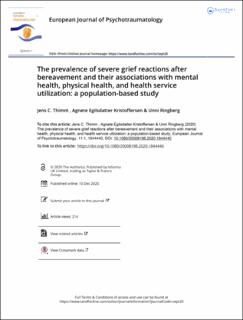The prevalence of severe grief reactions after bereavement and their associations with mental health, physical health, and health service utilization: a population-based study
Journal article, Peer reviewed
Published version

View/
Date
2020Metadata
Show full item recordCollections
Original version
European Journal of Psychotraumatology. 2020, 11 (1), 1844440 10.1080/20008198.2020.1844440Abstract
Background: Previous research has shown that bereaved individuals are at risk of developing physical and mental health problems. However, knowledge is scarce about the associations between severe grief reactions after bereavement and physical and mental health problems and the use of health services.
Objectives: The present study sought to investigate the prevalence of severe grief reactions and to study the associations of severe grief reactions with mental and physical health and health care utilization.
Method: The sample comprised 20,453 adults aged 40 and above (mean age = 57.2 years, SD = 11.3 years, 52.4% female) who participated in the seventh wave of the Tromsø study. Severe grief was assessed with one question asking whether the respondent has experienced the death of a loved one and currently has difficulty accepting the loss, yearns for the deceased, and experiences intense emotional pain related to the loss. Furthermore, participants answered questions about their current physical health, mental health (Hopkins Symptom Checklist – 10), and the use of health services in the past year.
Results: Overall, 5.2% of the participants reported severe grief after a loss in childhood, 25.9% after bereavement in adulthood and 4.1% after bereavement in the previous year. Female gender, higher age, living without a partner, non-Norwegian ethnicity, and lower socio-economic status were associated with severe grief. Severe grief reactions were negatively related to self-reported health, predicted positively current levels of depression and anxiety, and were positively associated with the use of health services. Effect sizes were small. Gender differences in the use of health services were observed.
Conclusion: Severe grief reactions are common in individuals aged 40 and older and associated with self-reported physical and mental health problems as well as increased use of health services. Health service providers should be attentive to possible severe grief in connection with health complaints.
